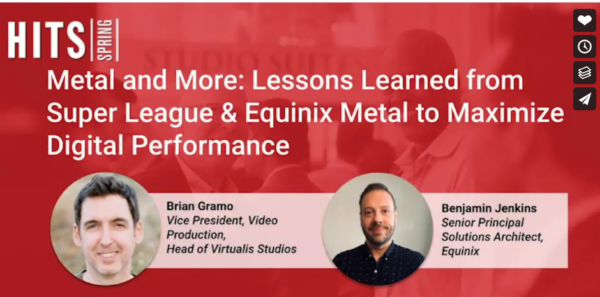M+E Daily

How Equinix Helped Super League Gaming Maximize Digital Performance
Story Highlights
Esports even producer Super League Gaming was searching for a way to maximize performance per server for its streaming toolset. The company selected the Metal platform from digital infrastructure firm Equinix and it enabled Super League to manage hypergrowth while also improving its already premium content experience, according to the companies.
Speaking during the Remote Production & Scale breakout presentation “Metal and More: Lessons Learned from Super League & Equinix Metal to Maximize Digital Performance” May 12 at the annual Hollywood Innovation and Transformation Summit (HITS) Spring event, executives from the companies provided details on the success story.
Metal was able to help improve performance and lower costs for Super League Gaming by providing a true bare-metal server experience (one that is used by just one customer) in exactly the right location, connected to exactly the right networks at exactly the right time, they explained.
 After testing multiple options, Super League discovered Metal could do everything it needed and scale on demand while consistently offering the performance needed to deliver the best experience to its broadcast crew in real time.
After testing multiple options, Super League discovered Metal could do everything it needed and scale on demand while consistently offering the performance needed to deliver the best experience to its broadcast crew in real time.
“Everything is built and deployed as if it were done with the perfect budget with an unlimited amount of time,” according to Benjamin Jenkins, senior principal solutions architect at Equinix. “Privacy is very important to us” also, he noted.
Meanwhile, the Equinix “fleet is constantly growing and we carry a lot of instances that are ready to go at a moment’s notice,” he told viewers. The platform is “like Data Center as a Service” (DCaaS) “wrapped in a cloud-like” application programming interface (API) “so that you can deploy real servers in real time with nothing between you and the server,” he explained.
Users can also “connect it to large cloud providers, all privately, all off-net,” he said.
Equinix has seen media and entertainment organizations use Metal “to get the raw power and speed of a real server with nothing slowing you down for” use in a Content Delivery Network (CDN), for video editing and for transcoding, he said.
“But one of the coolest things that I have ever seen is… real-time production using Metal” as Super League Gaming was able to do with it, he said.
Metal “can be part of [an organization’s] larger cloud strategy because you don’t have to put all of your eggs in one basket” with it, he explained, adding: “You can do business with everybody. We serve a very specific purpose, where you need the raw power and the privacy and the cloud adjacency of Metal.”
Brian Gramo, VP of video production and head of Super League’s Virtualis Studios production company, showed viewers how Super League used Metal.
“The beauty of this workflow is that I can spin up as many or as little instances that I want to when I’m expanding things,” Gramo explained, adding it also works on mobile devices.
“When I’m using one of [the] bare Metal machines… we really can load the machine up with lots of different tasks and we don’t have to worry about splitting the load up too much from machine to machine to machine,” he said, adding “it really can handle a lot of things going on” at the same time.
Among other things, it enables users to apply color correction in real time and adjust latency, he said.
But “what’s the best thing to me is that I can watch all of my editors editing in real time now,” he added.
When a lot of input/output and “lots of visualization” are required, especially when you might not have the best Internet connection, “this is the way to go,” he said.
To view the entire presentation, click here.
HITS Spring was presented by IBM Security with sponsorship by Genpact, Irdeto, Tata Consultancy Services, Convergent Risks, Equinix, MicroStrategy, Microsoft Azure, Richey May Technology Solutions, Tamr, Whip Media, Eluvio, 5th Kind, LucidLink, Salesforce, Signiant, Zendesk, EIDR, PacketFabric and the Trusted Partner Network.









